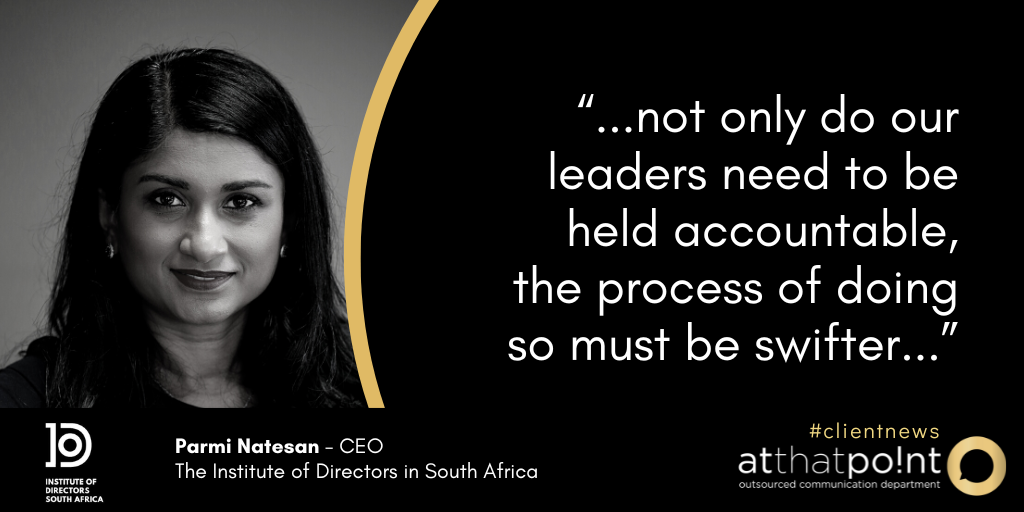 In its final report, the Zondo Commission repeatedly comments that directors of the various captured state entities have not been properly held accountable for the massive damage they have caused to the organisations they were supposed to serve, and thus indirectly to the country as a whole. The Institute of Directors in South Africa (IoDSA) strongly endorses these observations. “The issue of director accountability is one that the IoDSA has been raising in public forums for a number of years. In a letter to the Commission in September 2021, we specifically raised the point that not only do our leaders need to be held accountable, the process of doing so must be swifter,” says Parmi Natesan, CEO, IoDSA. “We recommended the establishment of a constitutional means of alternate dispute resolution to facilitate prompt and effective consequence management both for transgressing directors and those charged with exercising oversight over them.” In its final report, the Zondo Commission maintains that legal processes typically only manage to identify “egregious abuses of public power” when the perpetrators or those that protect them are out of power. The Report also makes the point that the delayed legal process is a “cumbersome, time consuming [sic] exercise”. It therefore recommends that the Companies Act’s 24-month time bar relating to delinquency directors should be extended. This would allow prosecution of, amongst others, the 2014 board of Eskom and two erring South African Airways directors.[1] One of those two directors, Dudu Myeni, the former chair of South African Airways, was declared a delinquent director in 2020 but, says Ms Natesan, only after an extremely time- and resource-intensive process. As a result, director accountability remains rare. The Report then makes a more sweeping recommendation that Government “give consideration to the creation of a statutory offence rendering it a criminal offence for any person vested with public power to abuse public power vested in that person by intentionally using that power otherwise than in good faith for a proper purpose” [emphasis in original].[2] “The IoDSA certainly supports the idea that the 24-month time bar should be extended to allow for holding the numerous defaulting directors identified in the Report to be investigated and prosecuted if necessary. Furthermore, we strongly believe that a more streamlined and rapid process needs to be found,” Ms Natesan says. “An excellent short cut would be to mandate that all directors have to belong to the professional body for directors, so that they could be disciplined under a Code of Conduct and barred from serving as directors if they are found to be in breach of their duties, without the long delays inherent in the legal process. “The benefit would be that the transgressing director would not remain in office while the legal process takes its course—something that would surely have contained the damage caused to SOEs like Eskom and SAA.” ENDS MEDIA CONTACT: Stephné du Toit, [email protected], 084 587 9933, www.atthatpoint.co.za For more information on the IoDSA please visit: Website: www.iodsa.co.za Twitter: @The_IoDSA LinkedIn: Institute of Directors in South Africa Company Page Facebook: Institute of Directors South Africa [1] Judicial Commission of Inquiry into Allegations of Capture, Corruption and Fraud in the Public Sector Including Organs of State, Report: Part VI, Volume 4: Summary of Recommendations 37 (p 95), 12 -3(p 3) and 119 (p 43), available at www.statecapture.org.za/site/files/announcements/672/OCR_version_-_State_Capture_Commission_Report_Part_VI_Vol_IV_-_Recommendations.pdf. [2] Ibid 119 (p 43), 122-6 (p44).
0 Comments
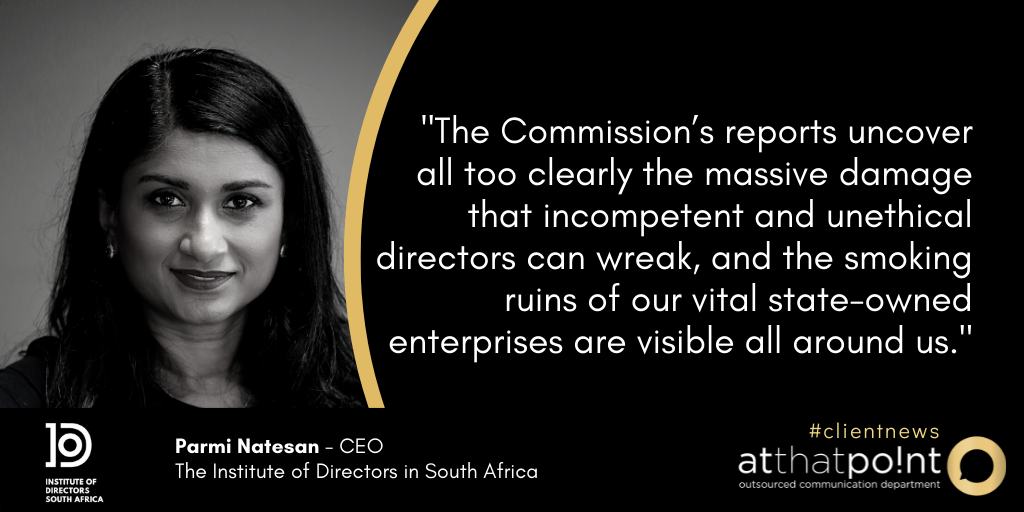 In its final report, the Judicial Commission of Inquiry into State Capture (Zondo Commission) recommends the enactment of legislation to establish a professional body for public procurement officials.[1] While there is no doubt this is a good move, the Institute of Directors in South Africa wishes to express its disappointment that its recommendation for a similar enforced body for directors was not acted on. “We wrote to the Commission in September 2021 setting out the compelling reasons to recommend the establishment of a statutory professional body for directors. By not doing so, we believe that the Commission missed a historic opportunity to alter fundamentally the governance landscape of the country for the better,” says Parmi Natesan, CEO: IoDSA. “The Commission’s reports uncover all too clearly the massive damage that incompetent and unethical directors can wreak, and the smoking ruins of our vital state-owned enterprises are visible all around us.” A mandatory professional body for directors would have the benefit of requiring that directors would have to keep their skills updated via a rigorous process of continuous professional development. The professional body would also be able to keep its members abreast of developments in governance best practice. Equally important, members of such a professional body would be bound by a code of conduct, in terms of which they could be rapidly disciplined and even have their membership terminated. Termination could in turn signal to the market to not appoint them as a director. “As we now contemplate the possibility of years of litigation to bring the main actors in state capture to book, establishing a mechanism through which unethical or incompetent directors could be swiftly and relatively inexpensively held to account looks very attractive,” she observes. The IoDSA further argues that alongside a statutory professional body for directors, there should be enforcement of formal director designations registered with the South African Qualifications Authority (SAQA). Such formal designations would provide a way to ensure that directors have the necessary competencies to serve as a director based on rigorous testing against a formal competency framework. Designation holders who fail to keep their skills updated in line with the CPD framework would have their designations removed, reducing their attractiveness to companies. The IoDSA already owns and awards two SAQA-recognised director designations—Certified Director (SA) and Chartered Director (SA). “Directorship is now a serious profession that requires individuals to possess a definite set of skills and competencies, and the ability to provide strong leadership based on sound ethical principles,” Ms Natesan concludes. “While this was not covered in the Commission’s final recommendations, the IoDSA will continue to lobby for directorship to become a regulated profession, providing both the public and private sectors with a growing pool of properly qualified individuals who have committed to ethical leadership and have signed on to a solid code of conduct.” ENDS MEDIA CONTACT: Stephné du Toit, [email protected], 084 587 9933, www.atthatpoint.co.za For more information on the IoDSA please visit: Website: www.iodsa.co.za Twitter: @The_IoDSA LinkedIn: Institute of Directors in South Africa Company Page Facebook: Institute of Directors South Africa [1] Judicial Commission of Inquiry into Allegations of Capture, Corruption and Fraud in the Public Sector Including Organs of State, Report: Part VI, Volume 4: Summary of Recommendations, 62, p24, available at www.statecapture.org.za/site/files/announcements/672/OCR_version_-_State_Capture_Commission_Report_Part_VI_Vol_IV_-_Recommendations.pdf. 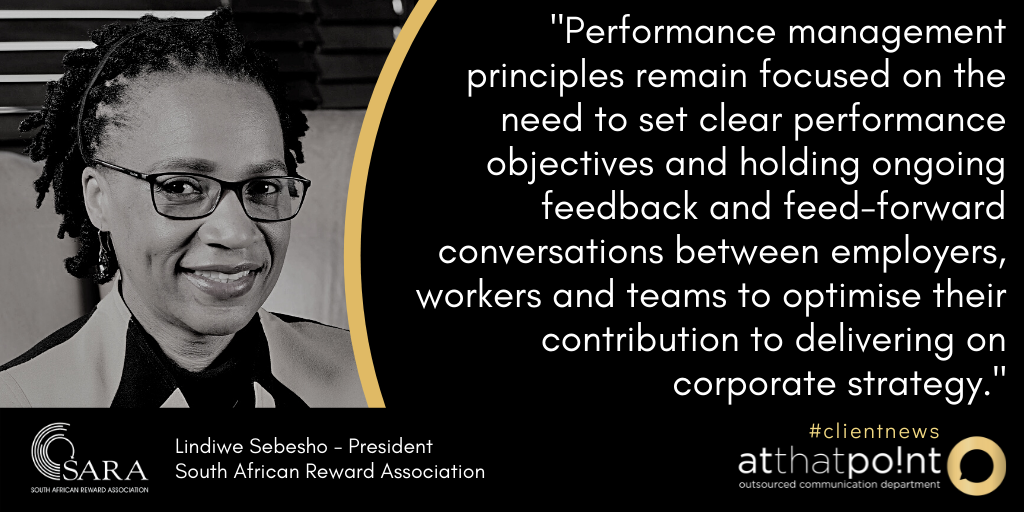 The decision by the board of Absa to remove Sipho Pityana has provoked an enormous amount of controversy and a great deal of debate. Parmi Natesan, CEO of the Institute of Directors in South Africa (IoDSA) says that the public needs to ensure it understands the law relating to the removal of a director, but that it also takes into account the complexities of the decision process the board would have undertaken. “The legality of Mr Pityana’s removal from the Absa board will be decided in reference to the stipulations of the Companies Act, which provides the conditions under which such an action may be taken,” she says. In terms of the Companies Act, there are two ways to remove a director. One is for the shareholders of the company to adopt an ordinary resolution at a shareholders’ meeting. The persons entitled to exercise voting rights in the election of a director would be eligible to vote in this matter. Alternatively, as was the case in this instance, the board can remove a director via a board resolution if a director or shareholder has alleged that the said director has become ineligible or disqualified from sitting on the board; is so incapacitated that he or she cannot perform directorial functions and is unlikely to regain that capacity within a reasonable time; or has neglected or been derelict in performing his or her directorial functions. In both cases, the affected director needs to be given notice of the meeting and the content of the resolution, as well as reasonable opportunity to make a presentation prior to the vote taking place. “We live in the Age of Social Media, and we are often quick to form and then voice strong opinions. In this instance, the Companies Act lays down the framework under which a director may be removed from office; and there is a due process to be followed,” she says. “In addition, even after the decision, the director concerned has the right to apply within 20 business days to a court to review the determination of the board.” We will now wait and see how this further legal process unfolds. This is a highly complex case, with many issues to be taken into consideration. One thing is clear though—boards have to take tough decisions if they believe it is in the best interests of the company, while staying within the lines of the law. Whether this was the case is a matter for the experts to decide, and we should let them do so. ENDS MEDIA CONTACT: Idéle Prinsloo, 082 573 9219, [email protected], www.atthatpoint.co.za For more information on the IoDSA please visit: Website: www.iodsa.co.za Twitter: @The_IoDSA LinkedIn: Institute of Directors in Southern Africa Company Page One of the most persistent challenges relating to governance is the tendency to focus on form rather than substance. In line with King IV, it’s time finally to accept that governance is not an end in itself, but a tool for delivering outcomes, says Parmi Natesan, Executive: Centre for Corporate Governance at the Institute of Directors in Southern Africa (IoDSA) and Professor Deon Rossouw, CEO of The Ethics Institute.
“Organisations only exist in order to deliver on their purpose and, similarly, governance only exists in order to help them do that,” says Professor Rossouw. “Governance got a bad name because people persist in seeing it in terms of compliance, structures and policies. Of course, these things are important only as tools to help deliver outcomes.” This focus on outcomes is very much a feature of King IV, which was designed to link governance practices with four governance outcomes, notes Ms Natesan. “The critical point is that structures need humans to give them life, to use them to deliver the desired results. Governing bodies must therefore ensure that the governance structures are indeed achieving the desired governance outcomes,” she says. King IV identified four governance outcomes: an ethical culture, good performance, effective control and legitimacy. Boards can therefore measure whether the structures they have put in place, and the way they are being used, are effective by measuring the extent to which these outcomes are being attained. Clearly, then, the personal qualities and actions of the members of the governing body are critical in ensuring that the governance objectives are achieved, that substance follows form. King IV retained the four cardinal values that should underpin good governance—responsibility, accountability, fairness and transparency (RAFT)—but added two further ones: integrity and competence. This recognises that governance structures will only be valuable if they are used by people who are prepared to put their own interests aside and act ethically in the best interests of the organisation, beyond mere legal compliance, and who have the requisite knowledge both of the organisation and the industry in which it operates. “It is important to recognise that governing-body members have to cultivate these characteristics in order to make them instinctual,” Professor Rossouw argues. “People aren’t born with integrity, competence or any of the others, they have to be nurtured.” As with any enterprise involving human behaviour, moving from form to substance is no easy task. Some guidelines for assisting are: • Select members of the governing body carefully. It all begins with selection, says Professor Rossouw, so nomination committees must actively seek people with these cardinal virtues. • Orient new members properly. Once selected, it is vital that new members of the governing body are properly educated about what their new role entails, and continually reminded that they are there primarily to serve the best interests of the organisation, not those of any particular stakeholder. • Structure meetings carefully to ensure that members have the right types of conversation, and do not confine themselves to ticking the boxes. Courage becomes important here—not just moral courage but also the courage to take the right risks. • Hold members of the governing body accountable. There are several elements to this. First, peer pressure must be harnessed to create a positive atmosphere in which members continually assess their own performance and that of their fellow members. Courage will also be at a premium here but it is equally important the board is truly diverse, says Ms Natesan. This is needed to overcome the “buddy mentality” in addition to measures like gender, race and age. At the same time, though, it must be recognised that self-appraisal is no substitute for the stakeholders assessment of the extent to which the four governance outcomes have been achieved. Ms Natesan stresses that there is not necessarily more unethical behaviour now, just that it is more visible—something she sees as positive. She argues that, going forward, how governing bodies disclose about governance and its results will become more and more important. The disclosure must convince stakeholders not just that the right governance structures are in place, but that they are delivering results, she says. Looking forward, adds Professor Rossouw, as we move away from compliance to reporting on integrated performance, the triumph of substance over form will be shown when it is clear that the organisation has not only achieved its purpose in the past, but is well-positioned to continue achieving it into the future. ENDS MEDIA CONTACT: Juanita Vorster, 079 523 8374, [email protected], www.atthatpoint.co.za For more information on the IoDSA please visit: Website: www.iodsa.co.za Twitter: @The_IoDSA LinkedIn: Institute of Directors in Southern Africa Company Page When interviewing potential directors, nominations committees should not forget to investigate the hidden soft skills without which hard skills can prove less than useful, says Sarita Martin, a facilitator of the Institute for Directors in Southern Africa (IoDSA) and an independent non-executive director.
According to Martin there’s more to a successful board than just assembling the right skills, knowledge and experience around the table. The dynamics around the boardroom table are influenced by the individual personalities on the Board. “Boards often comprise a group of dynamic, highly accomplished individuals with strong views,” she comments. “If those individual directors are to deliver real value to their organisations through robust and productive discussions, they must have what have historically been referred to as the soft skills to operate within the context of the group, or one simply ends up with a set of individual opinions and no coherent decision.” “Board members need to have the ability to be able to present their views in a respectful and coherent manner rather than be dictatorial.” Read the room The level of in depth discussion needed at board level is only possible if directors are able to listen well and are flexible enough to engage with others board members’ ideas to come up with new insights. The courage to express one’s opinion while also engaging genuinely with other points of view is particularly difficult as today’s boards become more diverse from – among other things – a gender, age and cultural perspective. This diversity is obviously intended to provide the organisation with better visibility across the full socio-economic and political landscape, but it can mean that boards have to balance widely divergent points of views. Often it is the body language and tone of voice of individual board members rather than their words that indicates their stance on a particular matter. Replace “me” with “we” Although eliciting the views of individual board members is crucial, it is important to remember that any board decision is a decision of the collective, of the majority of board members – the “we”. An observation is that many of the new generation of board members may have no board or executive experience. In particular, they may be unaware of the protocol of board meetings, which is designed to support a non-adversarial atmosphere whilst promoting robust discussion and debate. They may also not fully comprehend that the boardroom model is not a parliamentary one: the object is not to state one’s view as forcefully as possible and then vote, but rather to interrogate an issue from all angles in order to arrive at a decision in the best interest of the company. “It’s not who gets to make the decision, but the quality of the decision-making process itself. Directors have a fiduciary duty to act in the best interests of the company, not themselves or a certain viewpoint,” Ms Martin says. According to Parmi Natesan, IoDSA Executive Director, “The personal and social competencies for directors are just as critical and the functional/technical ones. In the awarding of the Chartered Director SA designation, significant emphasis is placed on assessing these softer skills. In addition, the IoDSA has also added two new programmes to its repertoire of director training – a practical boardroom simulation experience where delegates get to practices these skills; as well as a programme providing individuals who intend to become a non-executive director with a road-map to get there” Get it right, right from the start So how do nominations committees set about establishing whether prospective directors have not only the correct understanding of how board decisions are reached, but the emotional balance and insight to handle difficult discussions in such a way as to promote the best outcome for the organisation? It’s not easy, Ms Martin acknowledges, because potential directors cannot simply be asked to take a psychometric test. However, typical interview questions can be used to probe these areas. Understanding what motivates an individual to be a director in the first place can reveal how well he or she understands the role of the board. Nominations committees can assess during discussion with candidates about the business and corporate context how able the individual is to connect the dots to see the big picture. It also necessary to determine their understanding of corporate governance and how aware they are of current affairs. Verbal communication skills, so important in a board interaction, can also be judged during an interview. “Perhaps most important of all, nomination committees should look very carefully at what candidates have done in their lives and careers. This will not only show them whether the candidate possesses the requisite hard skills and experience, but also something about how they see themselves, and how they have displayed the ‘board temperament’ in the past.” “Ensuring that board members are emotionally aware and possess the soft skills including good verbal communication and listening skills will assist in effective board dynamics and ultimately robust decision-making at a board level,” she concludes. ENDS MEDIA CONTACT: Juanita Vorster, 079 523 8374, [email protected], www.atthatpoint.co.za For more information on the IoDSA please visit: Website: www.iodsa.co.za Twitter: @The_IoDSA LinkedIn: Institute of Directors in Southern African Company Page 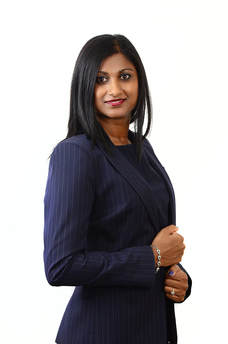 Institute of Directors in Southern Africa & The Ethics Institute Eskom’s decision to pursue disciplinary action against its suspended acting-CEO, Matshela Koko, raises important governance and ethical issues that directors and executives should consider carefully, say Parmi Natesan, Executive: Centre for Corporate Governance at the Institute of Directors in Southern Africa (IoDSA) and Professor Deon Rossouw, CEO of The Ethics Institute (TEI). “Mr Koko stands accused of influencing the awarding of lucrative contracts to a company in which his stepdaughter is a director. While we should be careful not to prejudge this specific case, conflicts of interest like this represent a major hazard for board members and executives, if they are not managed correctly from the start. All of us should see Mr Koko’s predicament as a wake-up call to make sure our own houses are in order,” says Natesan. The first point to make is that a senior executive like Mr Koko is both an employee of the company; and a deemed director or prescribed officer in terms of the Companies Act. Such a person is thus bound both by the internal policies of the company and the legal requirements of the Act. As regards the former, it would be necessary to see whether any company policies were breached in the way the contracts were awarded, and whether Mr Koko was himself involved in this process, and whether he disclosed his interest appropriately. “It needs to be made clear that claiming ignorance is not a good enough defense. As a senior executive, Mr Koko should have investigated actively the interests of any of his related parties, even to the extent of requesting them in writing to inform him if they had any interests in organisations doing business with the company,” she explains. “This would show that he took reasonably diligent steps to be informed. One should never lose sight of the fact that as a senior executive, he has to set an example to the rest of the organisation and protecting its reputation.” Natesan notes that conflicts of interest are to be expected in business, and do not necessarily constitute evidence of any impropriety: the key issue is how they are handled. King IV thus recommends that members of governing bodies should declare their financial, economic and other interests, and those of their related parties, at least annually. In the same vein, each board or board-committee meeting should be prefaced by a formal declaration of any specific conflicts of interest relating to the agenda. Professor Rossouw points to the fact that humans are naturally inclined to act in their own interests or in the interests of their immediate family and friends. While the Companies Act and governance codes like the King Reports are examples of legal and voluntary constraints to the pursuit of self-interest, they will ultimately prove ineffectual unless the individuals concerned act ethically. “I find it significant that the very first principle of the King IV Code on Corporate Governance emphasises that members of governing bodies, both individually and collectively, should act in an ethical manner. In unpacking what is meant by ethical behaviour, the Code starts by focussing on the personal integrity of members of the governing body. They are reminded that as directors, they must act in the best interest of the company, and that they must deal with conflicts of interest appropriately. King IV sees integrity as a characteristic that should be cultivated and exhibited, so that directors develop the inclination to act in the company’s best interests, not their own” he says. “By sensitising directors not only to actual conflicts of interest but also potential or perceived ones, ethics plays a crucial role in avoiding the reputational damage and financial costs when a conflict of interest is found, or even suspected not to have been handled correctly —as we see in the case of Mr Koko.” ENDS MEDIA CONTACT: Carla Coetzee, 072 112 8347, [email protected], www.atthatpoint.co.za For more information on the IoDSA please visit: Website: www.iodsa.co.za Twitter: @The_IoDSA LinkedIn: Institute of Directors in Southern African Company Page For more information on The Ethics Institute please visit:[DR1] Website: www.tei.org.za Twitter: @EthicsInst LinkedIn: The Ethics Institute Company Page  Based on recent research, Association of Certified Fraud Examiners (ACFE) estimates that the typical organisation loses 5 percent of its revenue to fraud each year. In South Africa, this equates to around R160 billion. The three main categories of fraud are asset theft, corruption and misstatement of financial statements. “Corruption and other sorts of fraud are all different aspects of the same problem—the improper use of an official position for personal gain. The direct costs are very high, as these figures show, but when one takes into account the indirect costs such as reputational damage, investigation costs, loss of business opportunities and lost efficiencies, they are even higher,” says Parmi Natesan, Executive: Centre for Corporate Governance at the Institute of Directors in Southern Africa (IoDSA). “The best defence against fraud of all kinds is corporate governance that really works, and that is the responsibility of the directors.” Principle 1.1 of King III states that the “board should provide effective leadership based on an ethical foundation” and Principle 2.1 that the “board should act as the focal point for and custodian of corporate governance”. Speaking at an IoDSA Corporate Governance Network (CGN) event on the board’s role in combatting corruption, Chairman of the CGN and Director at PwC, Anton van Wyk reiterates that corporate governance is critical because it seeks to create a climate that is inhospitable to fraud of all types. “It’s important to acknowledge that these things feed off each other, making a company that acts corruptly more vulnerable to other sorts of fraud. For example, when employees see that the company is willing to act illegally by bribing officials, they can begin to feel it’s OK to steal equipment,” he says. “The ethics of the company have to be consistent and pervade every aspect of its business.” This is particularly important because many companies argue that they have to participate in corrupt activities in order to do business in certain countries. But the rot cannot be contained, and such companies soon find themselves suffering from other types of fraud and also potentially losing business as their reputations are tarnished. For that reason, one of the most important contributions that directors can make is setting the right “tone at the top”, showing in the way they conduct board meetings, and the way in which they reward or censure the executive team, that the corporate leaders stand for ethical behaviour. This is the first step in actively managing the organisation’s ethics as required by King III. This active management means that boards have to ensure that the right structures are in place to combat fraud and corruption, and that they know who the company’s customers and suppliers are—as well as how the industry operates. Such knowledge will help boards not only understand the risks the company faces but also what is average in terms of performance. The board is then in a much better position to spot tell-tale signs of fraud or corruption. Signs might be a higher-than-average propensity to win government tenders, or a lower margin than comparable companies. “There’s no fixed checklist of things that directors should look out for, but the better informed they are, the more likely they are to understand what the red flags are,” says van Wyk. “But the best defence, in the end, is a clear and widely accepted moral or ethical corporate identity.” ENDS MEDIA CONTACT: Cathlen Fourie, 012 664 2833, [email protected] For more information on the IoDSA please visit: Website: www.iodsa.co.za Twitter: @The_IoDSA LinkedIn: The Institute of Directors in Southern Africa group |
Archives
July 2024
Categories
All
|

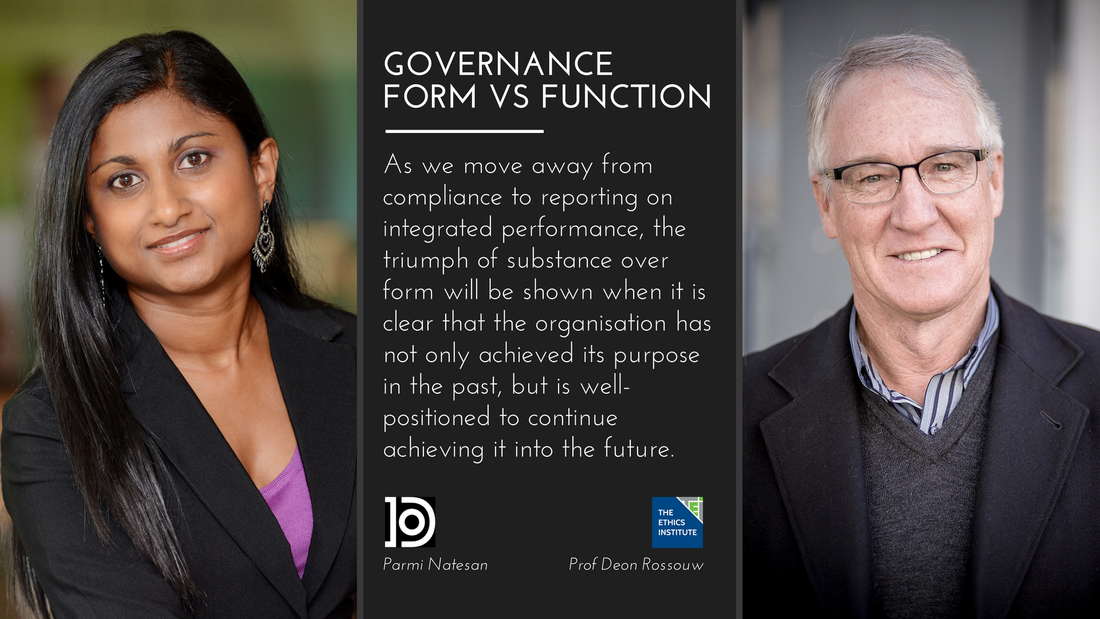
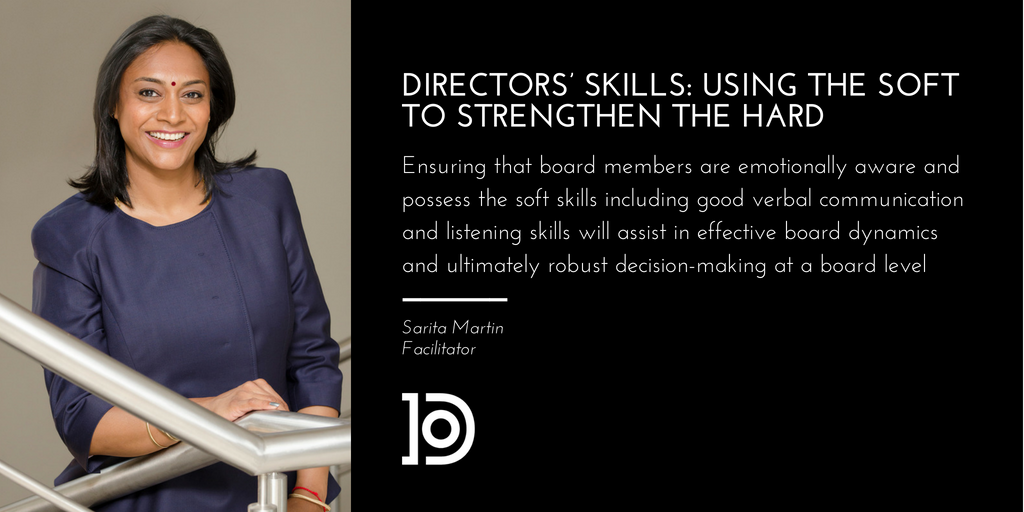
 RSS Feed
RSS Feed